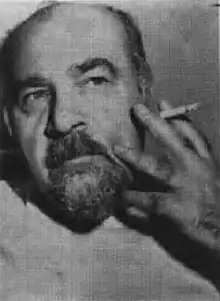Asghar Sayyed Javadi
Ali-Asghar Sadr Haj Seyyed Javadi (Persian: علیاصغر صدر حاجسیدجوادی; 1925–2018) was an Iranian writer, journalist and activist.[1] Politically, he was a dissident to both Pahlavi and Islamic Republic governments.[2]
Asghar Sayyed Javadi | |
|---|---|
 Sayyed Javadi in 1979 | |
| Born | Ali-Asghar Sadr Haj Seyyed Javadi 1925 |
| Died | 2018 (aged 92–93) |
| Nationality | Iranian |
| Organization | IWA ICDFHR (1977–1980) |
| Children | Négar Djavadi |
| Relatives | Ahmad Sayyed Javadi (brother) Nasser Katouzian (brother-in-law) |
According to Farhang Rajaee, he was "a leading intellectual of the day".[3]
Early life and education
He was born in 1925 in Qazvin. In 1951, he obtained a PhD in philosophy from University of Paris.[1]
Career
During his youth, he was a member of Tudeh Party of Iran but he later became a social democrat.[4] He was an essayist on Islam and Socialism and over a fifteen years period, his gained a large following who were mostly religious laymen.[4] An Iranian Writers Association member, he also wrote for Kayhan.[4]
Mehrdad Mashayekhi argues that he belonged to the Third Worldist current in Iran, and considers him among "radical nationalist intellectuals" who were closely associated with the League of Iranian Socialists.[5] Afshin Matin-Asgari states that he had an "independent socialist background" that he shared with people with Jalal Al-e-Ahmad. He was critical of the U.S. government neocolonialist policies from a Third Worldist perspective, as reflected in his columns published in the 1960s.[6]
In 1977, he was among the members and founders of the newly formed Iranian Committee for the Defense of Freedom and Human Rights (ICDFHR).[7] Mehdi Bazargan was elected as the head and Javadi as the vice head of the committee.[7] He became the head of the ICDFHR after the revolution.[7] However, the committee's office was closed in November 1980, and Javadi had to leave Iran in the fall of 1981.[7]
In 1979, he founded Jonbesh (lit. 'The Movement'), a relatively small group that belonged to the political center.[8] and ran for a Tehran seat for the Assembly of Experts for Constitution under the banner of Quintuple Coalition.[9] He garnered more votes than any defeated candidate and about one million less than the last elected candidate.[10]
Electoral history
| Year | Election | Votes | % | Rank | Notes |
|---|---|---|---|---|---|
| 1979 | Assembly of Experts | 298,360 | 11.81 | 11th | Lost[10] |
References
- Boroujerdi, Mehrzad (1996). Iranian Intellectuals and the West: The Tormented Triumph of Nativism. Syracuse University Press. p. 196. ISBN 978-0-8156-0433-4.
- Daneshvar, Parviz (2016). Revolution in Iran. Springer. p. 212. ISBN 1349140627.
- Rajaee, Farhang (2010), Islamism and Modernism: The Changing Discourse in Iran, University of Texas Press, p. 235, ISBN 9780292774360
- Hiro, Dilip (2013). Iran Under the Ayatollahs (Routledge Revivals). Routledge. p. 67. ISBN 1135043817.
- Mashayekhi, Mehrdad (2005). "The Politics of Nationalism and Political Culture". In Farsoun, Samih K.; Mashayekhi, Mehrdad (eds.). Iran: Political Culture in the Islamic Republic. Routledge. p. 60. ISBN 9781134969470.
- Matin-Asgari, Afshin (2018). Both Eastern and Western: An Intellectual History of Iranian Modernity. Cambridge University Press. p. 177. ISBN 9781108428538.
- Houchang E. Chehabi (1990). Iranian Politics and Religious Modernism: The Liberation Movement of Iran Under the Shah and Khomeini. I.B.Tauris. p. 231. ISBN 978-1-85043-198-5.
- Daneshvar, Parviz (2016). Revolution in Iran. Springer. p. 138. ISBN 1349140627.
- Near East/North Africa Report, Joint Publications Research Service, 2010, Executive Office of the President, Foreign Broadcast Information Service, 1979, p. 13
- Ervand Abrahamian (1989), Radical Islam: the Iranian Mojahedin, Society and culture in the modern Middle East, 3, I.B.Tauris, p. 195, Table 6; pp. 203–205, Table 8, ISBN 9781850430773